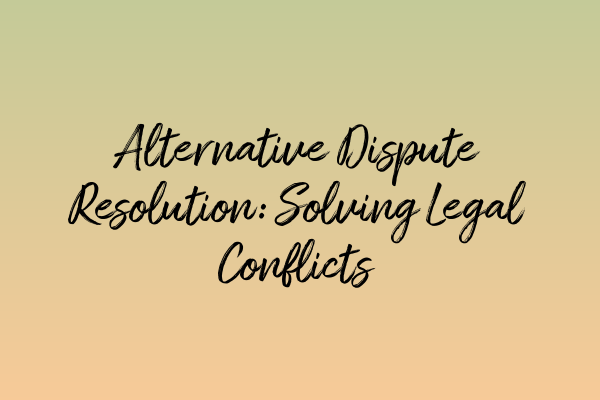Alternative Dispute Resolution: Solving Legal Conflicts
Welcome to our blog at Become Solicitor SRA! In today’s post, we will be exploring the topic of Alternative Dispute Resolution (ADR) and how it can be an effective method for resolving legal conflicts. Whether you are a solicitor, lawyer, or someone interested in the legal field, this post will provide you with valuable insights and information.
ADR refers to the process of resolving legal disputes outside of traditional courtroom litigation. It offers parties involved in a legal conflict an alternative and more cooperative approach to resolving their differences. ADR methods, such as mediation and arbitration, provide numerous benefits that are worth considering.
1. Mediation: The Power of Facilitating Communication
Mediation is a voluntary process where a neutral and impartial third party, known as a mediator, assists the parties involved in reaching a mutually acceptable agreement. This method encourages open and honest communication, allowing the parties to express their concerns, interests, and desires while working towards a resolution. Mediation is often faster, less formal, and more cost-effective than going to court.
If you want to learn more about private prosecutions, click here to read our article on Private Prosecutions: Exploring Non-Governmental Prosecutions in Criminal Cases.
2. Arbitration: Achieving Resolution with Expert Decision-Making
Arbitration is a process where parties present their case to a neutral third party, known as an arbitrator or panel of arbitrators. Unlike mediation, an arbitrator has the authority to make a final and binding decision on the dispute, based on the evidence and arguments presented. This method provides a more formalized approach to dispute resolution, resembling a court setting but with less complexity and cost.
To explore ethical challenges in criminal defence, take a look at our article on Ethical Challenges in Criminal Defence: Navigating Dilemmas.
3. Benefits of ADR: Time, Cost, and Privacy
One of the main advantages of ADR is its efficiency. Legal disputes can take months or even years to be resolved through traditional litigation, resulting in both financial and emotional strain. Alternative Dispute Resolution techniques can significantly reduce the time it takes to reach a resolution, allowing parties to move forward with their lives and businesses. Moreover, the cost of ADR is often substantially lower than engaging in a full-blown court battle. This makes ADR an attractive option for individuals and companies seeking a more budget-friendly solution.
If you want to deepen your understanding of drug-related offences, check out our article on Understanding Drug-related Offences: Laws and Penalties in the UK.
ADR also offers a higher level of confidentiality and privacy compared to court proceedings. Since ADR sessions are confidential, parties can freely discuss their concerns and interests without fear of public exposure. This can be particularly beneficial in sensitive matters or high-profile cases where privacy is a concern.
4. When to Consider ADR
While ADR can be an effective method for resolving legal conflicts, it is important to evaluate whether it is the right approach for your specific case. Factors to consider include the nature and complexity of the dispute, the willingness of all parties to engage in the ADR process, and the desired outcome.
If you want to learn more about the differences between Magistrates’ Court and Crown Court proceedings, our article on Magistrates’ Court vs Crown Court: Different Paths in Criminal Proceedings provides a comprehensive overview.
5. Consult an ADR Specialist
To ensure the best possible outcome in an ADR process, it is advisable to consult with an experienced ADR specialist. A solicitor with expertise in Alternative Dispute Resolution can guide you through the process, help you understand your rights and obligations, and provide valuable advice to reach an agreement that meets your interests.
If you are interested in exploring various criminal defence strategies, our article on Criminal Defence Strategies: Expert Approaches to Protecting Clients’ Interests will provide you with valuable insights.
In conclusion, Alternative Dispute Resolution offers a compelling alternative to traditional litigation for resolving legal conflicts. Whether through mediation or arbitration, ADR provides an efficient, cost-effective, and confidential approach to reaching an agreement. If you are facing a legal dispute, it is worth considering ADR as a viable option. Consult with an ADR specialist to ensure the best possible outcome for your case.
We hope this article has provided you with valuable information on Alternative Dispute Resolution. If you have any questions or require further assistance, please don’t hesitate to contact us. Stay tuned for more informative posts on various legal topics from Become Solicitor SRA.


Leave a Reply